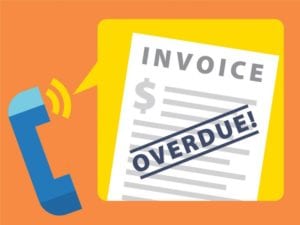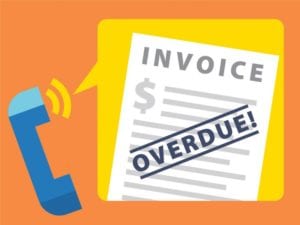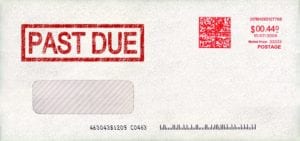
How Much Does It Cost to Hire A Collection Agency?
Many business owners are concerned about spending good money to chase after past-due customers. Discover how much it will cost to hire a collection agency, and what to expect if you do.
As a small business owner, you are faced with receivables, and you may wonder what the best way is to get clients to pay. Many smaller companies are turning their receivables over to collection agencies. When reviewing this as a possible choice, you may wonder how much does it cost to hire a collection agency and do the benefits outweigh the costs.

Unpaid Receivables
If you have outstanding invoices from clients, you're not alone. A 2017 report by Sage says that 10 percent of invoices never get paid or are paid so late that companies are forced to write them off.
Small to medium-sized companies usually don't have enough staff to dedicate them to tracing down outstanding invoices. If you have mounting numbers of outstanding receivables, it may be time to bring on a Collection Agency.

What does a Collection Agency Do?
Once you've sent your receivables to a collector, you may want to know how they collect on them. You should be asking this question BEFORE you select an agency to represent your business. There is a lot to learn before you decide which agency to choose to collect on your behalf.

Why Hire A Collection Agency?
There are few reasons why you might consider hiring a collection agency, and we've tried to summarize them here:
- They can help you collect money owed – Ernst & Young found that “third-party collection agencies recovered approximately $44.6 billion in post-commission debt in 2010.”
- They can help with difficult accounts – If you've set up your payment collection process well, an agency should only be needed for worst cases.
- It can help take the pressure off your billing staff – reaching out to clients about their overdue balances can be stressful and put a strain on the client-provider relationship. Using an agency takes the pressure off your business and staff. Make sure all the related departments now how to handle calls when clients with overdue bills receive letters.
- They have access to methods your in-house staff don't – whether it is strongly worded collection letters or how to find debtors who have moved without a forwarding address agencies have access to exceptional resources. They can do a better job of collecting on many accounts that your in-house staff can't.

Of course, there are a few cons as well as pros:
Cost of hiring a collection company can be high – Usually, the price is between 20% and 50% of the amount collected. Depending on the amount of debt you are losing, it may not be worth the cost.
It could cause hard feelings – Clients may be put off after receiving a call from a collection agency. Some clients want to pay their bills, but the amount has created a hurdle. How the collection agency approaches them is also essential. If they are too aggressive, it will reflect poorly on your business.
See Top 10 Collection AgenciesYou may not get the return that you anticipated – sometimes by the time the account is turned over to a collection agent, and the client is less willing to pay. As it is only the most challenging accounts are turned over to an agency. Make sure they are setting clear expectations from the beginning. By doing so, you can reduce the amount of bad debt your business accrues.
It could be too soon – before turning over outstanding accounts to an agency, check that your office has done all they can to collect on them. Often companies turn to collections too prematurely.
A few things to ask during the selection process are:
Research Top Collection Companies
Every agency has its specialties. Some are better for big companies or specific types of companies. Others are experts at collecting from small or home-based businesses. Be sure the agency you select can fulfill your needs.

Are they insured?
If any agency refuses to disclose anything about their practices, you can be sued by the debtor if they are overly aggressive in their methods. No matter whether you can win such a case, it's better if you are not the one being sued for the actions of your collector.
Are They Qualified?
It may seem an obvious question, but before you hire an agency, it is essential to determine whether they are qualified and licensed to act as debt collectors. Not every state has licensing requirements, but most do.
How will debt collectors work for you?
When meeting with agencies that you may select, keep in mind that, in most cases, they are working on your behalf. You want to be sure that you agree to the tactics they will use. Even better, work with the agency to develop a plan that you both can live with the methods they will be using.
Remember, even if something isn't illegal, doesn't mean you want to have your company associated with it. With a plan in place, you know that the debt collector is treating former clients in a way you'd want to be treated and will still get the job done.

What is their experience?
Be aware of your collector's previous experience. Ask for a few business references and look for a few on your own. Find out if they have worked with other companies in your industry. Make sure they have experience with your specific business sector so that their collection efforts will be useful.
Can You Break Your Contract with the Collection Agency?
After you've signed a contract with a collection agency, you may have that “what have I done moment.” As you wonder how to get out of it, check your contract for a termination clause. If there isn't one on it, contact the agency, and directly negotiate for a settlement to get out of the contract.
A termination clause will specify a fee or explain how to give notice within a specific time frame to null the contract. There could be a deadline by which the agency must deliver the collection of the debt. Or if the company has provided a fraudulent agreement, after consulting with an attorney, you can usually sever the contract.
There may be other grounds for termination of the contract, as well. For example, if they don't fulfill specific points of the agreement, you could possibly break the deal. Lastly, you could ask the agency how much their cancellation fee is upfront.

How Much Does It Cost to Hire a Collection Agency?
When we consider the costs associated with hiring a collection agency, there is more to consider than their fee. You should weigh how much it would cost if your staff were to handle the collections. This calculation sets the bar that will help you measure whether the benefits outweigh the costs.
For example, consider that the cost of having your in-house staff send a single invoice falls between $16- $30 when you include all the costs. When you factor in salaries, stationery, printing, mailing, utility costs, errors, software, and others, you are looking at a minimum of $50 for each account.

Types of Debt Collector Fee Structures
Fixed Flat Fee – Many agencies will charge a fixed flat rate per account. It can be any amount from $20 to $10. This amount probably doesn't sound like much when you compare to the in-house costs. Still, how can you be sure the money spent is a good investment?
More business owners are worried about spending money to go after past-due customers.
Their concern is not misplaced. If you have to pay an agency upfront, where is the motivation to recover the monies owed?
Contingency Collections – Another payment structure is Contingency Collections. Under this structure, you only pay once the debt has been collected. Most often, agencies offer this option for extremely delinquent debts that are difficult. The fee is higher and is a percentage of the debt collected.
For example, a medical office hires an agency to collect a debt of $5000 from 10 former patients. The agency is retained at a 25% contingency rate.
The agency is successful in collecting from 4 of the former patients for a total of $2,200 in payments. The agency keeps 25% of this amount, which comes to $550. Of course, the medical office is happy to get the $1650 that might never have received without the agency.
Often Contingency Collections are referred to as “No Payment No Fee” collections.
Can Collection Agencies Sue For a Debt?
It may surprise you to learn that debt collection agencies can sue on your behalf to collect a debt. If you thing small amounts of debt are protected from lawsuits, think again. It's up to the debt collector to decide whether to sue for the debt, no matter the amount.

Should You Hire a Collection Agent?
As you can see, there is a lot to consider before coming to this decision. The final decision rests on you. If you have accounts over 30 days past due and your in-house billing staff has been unsuccessful at recovering it, it may be time to consider it.
Now that you have an idea of “how much does it cost to hire a collection agency”, it is time to find the company that will be the best match. Where can you find these companies? In addition to the many reviews you can find on our website, you can contact us to receive free information and price quotes.
See Top 10 Collection Agencies
Author: Hudson Piccini
Hudson Cynar, a Harvard University alumna and the owner of three prosperous enterprises, is a distinguished business consultant, author, and writer. Her expertise spans multiple business sectors, with a particular emphasis on storage containers, commercial copiers, payroll services, and medical billing software. Dedicatedly investing thousands of hours into product and service research, Hudson crafts insightful reviews to guide entrepreneurs in making informed decisions for their businesses.